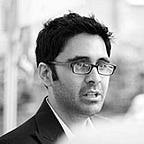The Chaos Factor
Why Tomorrow Won’t be Like Yesterday
We’ve grown up in a world like a warm blanket. Safe and secure, peaceful and placid. Every now and then, something might jerk us awake, like a nightmare. But on the whole, life was tranquil, calm, simple.
Only now the threads of that blanket are beginning to fray. What I’ll call the world’s chaos factor is spiking, and I don’t think it’s going back down. At least not in our lifetimes, and probably beyond.
Chaos factor. What do I mean? I’m not a big fan of pseudo-quantification. But it consists of the following elements. Global political order, stable broadly shared economic growth, and social cohesion. Translation: international agreements, real leaders, thriving middle classes, and life changing breakthroughs. No, not the iPhone 7. Antibiotics.
All of those are now disappearing.
Why? Let’s put the rise of the rising chaos factor in perspective.
There are two great, fundamental problems in the world today. First, the global economy is stagnant for the first time in modern history. Second, the planet is beginning to melt down.
These are really two sides of the same problem. The global political economy vastly undercounts real costs, like a ruined environment, and overcounts real benefits, like imagining a sixty inch TV offers more you actual human benefits than a fifty inch one (or, say, working healthcare).
In this sense, the global economy is now a fiction. What is measured – GDP – does not reflect human reality. That is why the economy grows, even though the average persons life is getting demonstrably poorer. Witness falling life expectancy in the US for the first time since the industrial revolution – while the economy “grows”.
A broken global economy. A melting planet. What are these likely to produce?
A spiral into a new dark age. Hyperbole? Did you seriously imagine a bona fide fascist bigot would be running for president of the world’s most powerful country even a year ago? Let us continue then. Just as I predicted the global financial crisis, the fall of the middle class, and the rise of demagoguery, so exploding chaos factor is very real.
A spiral. Simon Johnson once evocatively called such a thing a “doom loop”. What’s the spiral of chaos like?
Poverty unleashes racism and bigotry which produces demagoguery. Demagoguery leads to nationalism and isolationism. Nationalism creates a globe that cannot solve the problems of climate change and stagnation. So they grow worse, fuelling the fire. And down we go.
For example: Borders close. Agreements are torn up. It’s every country for themselves. But this is the precise moment at which we need greater international openness to solve climate change, terrorism, a lost generation of young, and so on. These problems then grow worse, not better.
Or: Climate change sends tides of refugees to rich countries from poor ones. The rich turn them away. The poor mass at their borders. The rich build walls and bombs instead of fixing the real problems.
Chaos factor will come to define our lives. What does life under chaos look, feel like? The breakdown of the rule of law and the return of caste-based servitude societies. You don’t have to look much further than student debt that follows you after death to see it. Dynastism. Like the Kardashians, Trumps, Waltons wielding outsized power to allocate social resources. Middle classes descending into instability, insecurity, precarity. Just like the tattered American Dream.
It’s an ugly picture. A picture of a thriving garden that, gone to waste, is now a jungle. Where the quickest, sharpest-toothed predators are the only ones who really survive, and the rest hide in the shadows, praying for more darkness. That’s the thing about dark ages: when the monsters come out, it’s only more darkness that you think can save you.
But what you really need is light. To banish the creatures that only come out in the dark. In the vacuum of chaos, new ways can be born, new sparks can be lit. Maybe we can’t fix the world, or even save it. But we can imagine, create, build, very different, and far more humane, sane, gentle, and prosperous ways of living together on this earth. And, step by step, practice them.
Let us choose that path instead.
Umair
Philadelphia
September 2016
